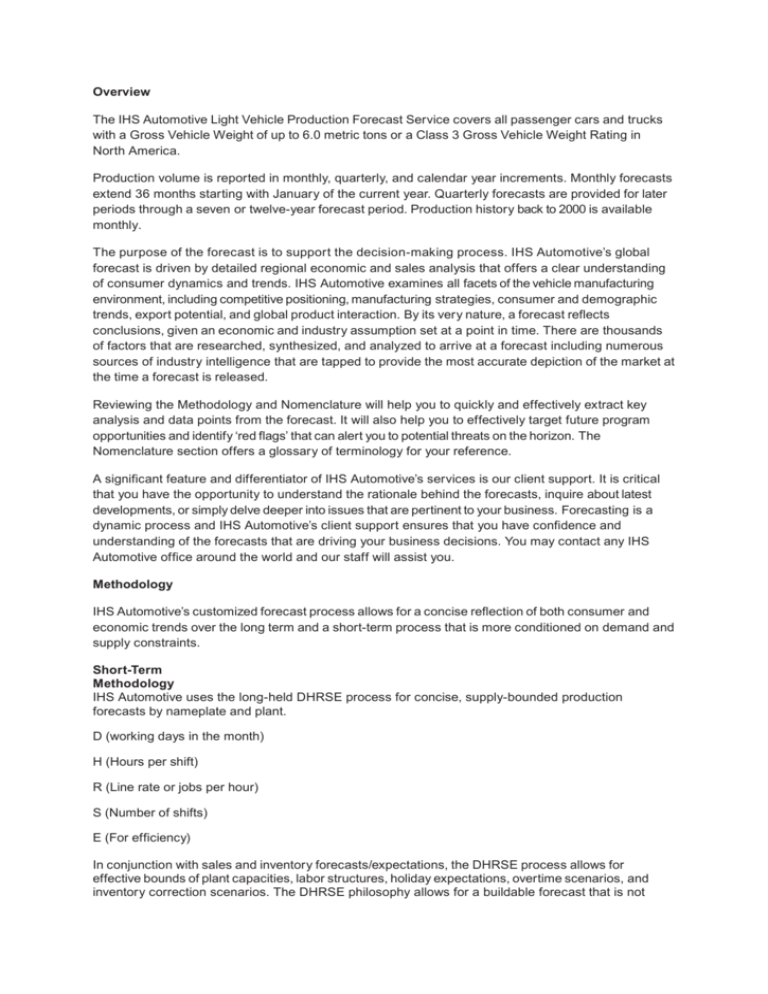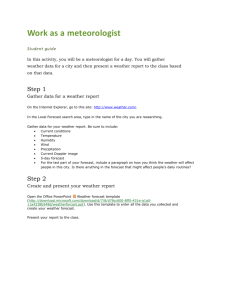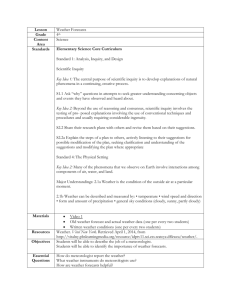Methodology Summary - Production Forecasts
advertisement

Overview The IHS Automotive Light Vehicle Production Forecast Service covers all passenger cars and trucks with a Gross Vehicle Weight of up to 6.0 metric tons or a Class 3 Gross Vehicle Weight Rating in North America. Production volume is reported in monthly, quarterly, and calendar year increments. Monthly forecasts extend 36 months starting with January of the current year. Quarterly forecasts are provided for later periods through a seven or twelve-year forecast period. Production history back to 2000 is available monthly. The purpose of the forecast is to support the decision-making process. IHS Automotive’s global forecast is driven by detailed regional economic and sales analysis that offers a clear understanding of consumer dynamics and trends. IHS Automotive examines all facets of the vehicle manufacturing environment, including competitive positioning, manufacturing strategies, consumer and demographic trends, export potential, and global product interaction. By its very nature, a forecast reflects conclusions, given an economic and industry assumption set at a point in time. There are thousands of factors that are researched, synthesized, and analyzed to arrive at a forecast including numerous sources of industry intelligence that are tapped to provide the most accurate depiction of the market at the time a forecast is released. Reviewing the Methodology and Nomenclature will help you to quickly and effectively extract key analysis and data points from the forecast. It will also help you to effectively target future program opportunities and identify ‘red flags’ that can alert you to potential threats on the horizon. The Nomenclature section offers a glossary of terminology for your reference. A significant feature and differentiator of IHS Automotive’s services is our client support. It is critical that you have the opportunity to understand the rationale behind the forecasts, inquire about latest developments, or simply delve deeper into issues that are pertinent to your business. Forecasting is a dynamic process and IHS Automotive’s client support ensures that you have confidence and understanding of the forecasts that are driving your business decisions. You may contact any IHS Automotive office around the world and our staff will assist you. Methodology IHS Automotive’s customized forecast process allows for a concise reflection of both consumer and economic trends over the long term and a short-term process that is more conditioned on demand and supply constraints. Short-Term Methodology IHS Automotive uses the long-held DHRSE process for concise, supply-bounded production forecasts by nameplate and plant. D (working days in the month) H (Hours per shift) R (Line rate or jobs per hour) S (Number of shifts) E (For efficiency) In conjunction with sales and inventory forecasts/expectations, the DHRSE process allows for effective bounds of plant capacities, labor structures, holiday expectations, overtime scenarios, and inventory correction scenarios. The DHRSE philosophy allows for a buildable forecast that is not driven by free-ranging statistical models in the short term. The system takes into consideration a myriad of factors, including launch scenarios, sales, and inventory forecasts. Long-Term Methodology IHS Automotive utilizes a more traditional forecast method that, while driven by an integrated sales forecast, considers several economic and industry factors. Past a two- to three-year time horizon, several factors are more flexible and adaptable. Production capacities, regulations, labor contracts, consumer trends, and other factors can vary. A system such as DHRSE is substituted by a capacitybounded nameplate/plant production forecast driven from an integrated sales forecast. IHS Automotive’s vehicle forecasts are linked and sourced between sales designation and production source. The combination of the DHRSE process best suited to short-term time horizons and a traditional longer-term process allows IHS Automotive to deliver a high-quality forecast that integrates our economic and industry scenarios.








